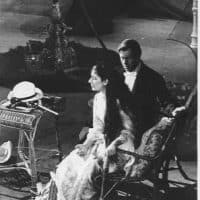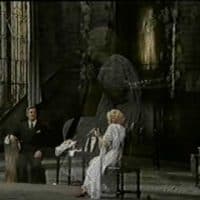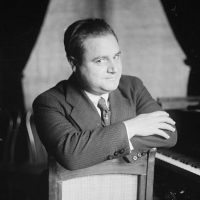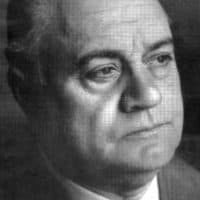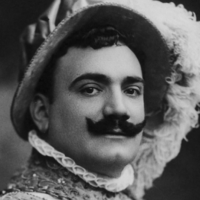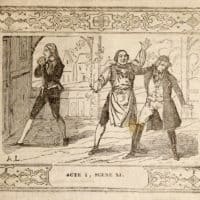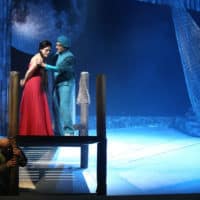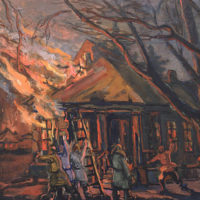Without doubt one of the great moments in any good opera performance is when a singer unleashes a thrilling, full-blooded high note that rips across the combined sound of the orchestra and ensemble leaving the audience a gasp and astounded. Tenors (and their followers) have often been famed, and perhaps accused, for their love of the ‘acuti’ (especially the high C), and one of the most celebrated excuses in the Tenor canon for this to occur is in the role of Manrico, from Verdi’s “Il Trovatore”. The cabaletta ‘Di Quella Pira’ is a veritable “Everest” of a piece of music that can seal the fate of many a performer. Many have attempted to scale its treacherous face, some with more panache or gusto than others and some of who never quite reach the top, though one cannot deny that, for the conqueror, it can secure the greatest ovation of the evening.
I have to confess that when I used to buy a new recording of “Il Trovatore”, I always forwarded to the ‘Pira’ to see how good the tenor’s top note was (the unwritten high C, of course). If done well, it might heavily influence my overall opinion of the tenor undertaking the role. I would also be slightly disappointed if the tenor transposed down the cabaletta, because I would feel somewhat cheated out of the thrill of hearing the high C.
Now, I would be the first to admit that this is a ridiculously superficial way of looking at a magnificent piece written by such a great composer as Verdi. I would also beg utter forgiveness to the poor Manricos for whom I have judged their hard-earned and nerve-wracking performance on the basis of one note, though, in all seriousness, I wonder how much the ‘Pira’ influences the casting, appreciation and indeed interpretation of the role of Manrico in today’s performances? Perhaps not in the “Can he reach a high C” stakes, but it might be that the acknowledgement of this ‘Heroic’ outburst during the opera could unfairly sway the overall opinion of the role?
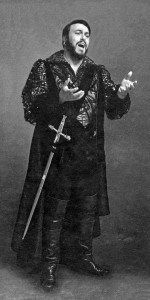
Today the role of Manrico is generally associated with Heroic voices and Spintos, though opinion is divided as to whether this should necessarily be the case. Many of the famous dramatic tenors over the last 100 years or so have made this their calling card and have achieved great success in the role. Other sources state that the role is far more lyrical and should be sung by a lighter, more graceful tenor (Muti even suggests that Alfredo Kraus would be an ideal protagonist for the most part of the opera). Can it really be as cut and dry as ‘one or the other’ or is the role of Manrico far more complex than we imagine? Is today’s view correct in its assumption of the spinto/dramatic nature of the role, or has the original concept been misinterpreted due to the obvious enjoyment of the ‘Pira’? To answer this we need to evaluate the evidence we have in the score, and in the libretto, so as to see what Verdi’s conception of the role might have been, and whether it resembles what it has turned into today.
The first and most obvious clue we have as to the character of Manrico is from the title of the opera: “Il Trovatore” or “The Troubadour”. Troubadours were originally aristocratic poet-musicians of Southern France (Provence) who flourished from the end of the 11th century through to the 13th century. Many troubadours were noblemen and crusader knights; some were kings, e.g., Richard I, Coeur de Lion; Thibaut IV, king of Navarre; and Alfonso X, king of Castile and León. Eventually the tradition moved over Europe, including Spain and Italy, and the common characteristics of these wondering musicians tended to be that of the lonely singer, whose melancholy serenades spoke mainly of love and their solitary plight. Looking at our chosen character, we see that Manrico fits this description perfectly: he is a knight, fighting in the rebellion against the King of Aragon, and is also a troubadour, whose autobiographical songs speak of the same subjects, mentioned above (“Deserto sulla terra” & “Ah che la morte ognora”). From this we can already see a juxtaposition of opposing styles that begin to complicate the character of Manrico: the heroic and the romantic, the Soldier and the Singer, the Spinto and the Lyric. In saying this, we must also remember that Verdi named the opera “The Troubadour” and not “The Knight”.
In the music we also find other clues as to the type of singer suitable for the role of Manrico. The musical nature and accomplishment of his character is reflected, as you would expect, in his own vocal line, which is filled with various embellishments, specific rhythmic features, varying dynamic effects and even trills. Even though such musical features can be found in other Verdi tenor roles, the abundance of them in the role of Manrico highlights, even more so, the need for a technically proficient singer so as to make the association with his own character plausible.
We are also fortunate enough to have a more direct clue as to the sound and affect of Manrico’s singing. It is not often that the composer gives us an idea of what the protagonist should sound like, yet Verdi clearly shows this in the second aria of the whole work. Despite the fact that this is not even sung by him, “Tacea la notte” is a description of Manrico’s serenading and the subsequent feelings it evoked in Leonora. It is one of the most beautiful and serene arias in all opera, and these characteristics are surely meant to reflect the beauty and romanticism of his serenading. In short, Manrico’s singing needs to be attractive, so as to evoke the feelings of love and attraction in Leonora. She is drawn in particular to his voice and the words he sings, and seemingly less so to his exploits on the battlefield (though she does mention that it was at the tournament that she first saw him). If the tenor cannot manage this lyricism and beauty, it not only fails to establish the point of her aria and the title of the whole opera, but also makes one question the reasons behind the ensuing love triangle, which forms the subplot of the overall drama.
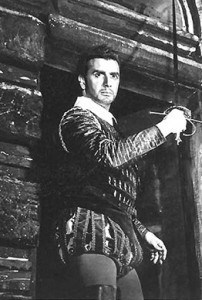
The relationships between Leonora, Manrico and di Luna are key to the development and enhancement of the true tragedy of the main plot (which is the quest for revenge for both di Luna and Azucena). Their various encounters with each other also act as catalysts to the exposition of the main plot. Azucena’s capture by di Luna is as a result of her searching for Manrico, who has gone to save Leonora from taking the veil. Di Luna’s rage over his rival is further fuelled when he discovers that Manrico is the son of his brother’s killer. The double execution of mother and son would truly avenge his father, though as we find out, it is actually Manrico’s death at the hands of his true brother that completes and exacerbates the tragedy of di Luna. The whole cohesion of the operatic drama is at risk if we cannot believe in the characters and the situations that are being portrayed. We need to believe why Leonora falls for Manrico and not for di Luna, and for this we need to see a contrast between the two male characters. We also need to realise the extent of Manrico’s devotion to Leonora so as to understand why he must rescue her from the veil, and leave his mother, who subsequently searches for him and gets caught. If the subplot fails to make sense, due to a lack of character portrayal, the affect will be felt on the rest of the drama, and will hence reduce “Il Trovatore” to being simply an opera with a bizarre story, but great music.
With regards the contrast between Manrico and di Luna, we recognise that Leonora does not fall for the protestations of di Luna, who incidentally seems a worthy suitor, as Commander of the King’s guard. Instead she falls for a wondering minstrel, who, although being a soldier and courageous Knight, has other endearing qualities that attract her. As a troubadour, we know that he will sing melancholy songs if he cannot be with the one whom he loves (“Deserto sulla terra” etc.). If di Luna cannot have the women of his dreams, he resorts to kidnapping them or bargaining another’s life in return for his prize. Despite the fact that he sings the beautiful aria about Leonora in the second act (“il balen del suo sorriso”), we need to remember that he is speaking such words whilst on the brink of forcibly abducting her. One final point, although being slightly more tentative is that Manrico and di Luna are brothers, and hence may look similar to each other, leading one to suppose that Leonora’s dislike of di Luna is based on something other than his physical attributes.
As we can see, although di Luna and Manrico have some military and potentially physical similarities, they also have marked differences in their characters that need to come out through the music and the drama, otherwise you would not understand Leonora’s preference for Manrico. If both male parts were played by solely heroic, strong voices, you would be forgiven for seeing them as just being two soldiers, and would be puzzled as to why the opera was entitled ‘ The Troubadour’.
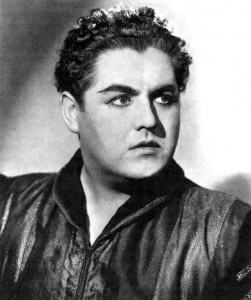
Throughout the opera, Manrico serves several different purposes to the various characters he meets. We already know that to di Luna, he is a rival, a rebel, and through his execution, he will be the cause of di Luna’s greatest tragedy. To Ruiz and his soldiers, he is seen as a courageous leader who they look to for inspiration and leadership in the battle against Aragon. To Leonora, he is the love of her life and the reason for her living, though in addition to this he also fulfils the role of comforter, a trait that also manifests itself in his relationship with Azucena. The purpose of his only true aria (“Ah si, ben mio”) is to comfort Leonora over the potential danger that they are facing and to reassure her of the strength of their love. In the last act, he calms Azucena and sings her to sleep so as to settle her nerves over their impending execution. For proof that he ‘can’ fulfil this role we need only remember the serenity of ‘Tacea la Notte’, to show that his singing can soothe the most worried of hearts. Again such a thing would be unbelievable if the tenor could not manage the requisite lyricism for the role, and could only serve the heroic aspects.
So far the current picture of Manrico does seem to favour that of the lyric singer, though such an assumption would neglect the undoubted ‘darker’ and stronger aspects of his character, which require something more than just beautiful singing. He is impulsive, firstly by the way he reacts to Leonora’s case of mistaken identity in the first act, and by his hot-headed assumption over how she intends to save his life in the last act. Though such mistakes are be understandable in the circumstances (and indeed he does quickly rectify his faults), Manrico is also quick to challenge di Luna to a duel, and is disturbingly graphic in the way he describes the fate of his mother’s captors in the “Pira”. To counteract the solely lyric argument, it would be ridiculous to have a sweet voiced tenorino speak of ‘using the blood of his enemies to quench the flames of his mother’s funeral pyre’. Yet although he shares the same fiery nature of di Luna, and is heroic in his rescuing of Leonora (twice) and his mother, there is something almost celestial or “Guardian Angel” in his presence. Leonora even questions whether he is actually sent from God (Act 2 Scene 2: “Sei tu dal ciel disceso…?”), and we remember that the words of his serenade were likened to a man at prayer, in her first act aria (“qual d’uom che prega iddio”). Di Luna also claims that a rival God opposes his love for Leonora (“un Dio rivale s’oppone all’amor mio!”) and not even a divinity can steal her away from him, when she is about to take the veil (“Non puo nemmen un dio, Donna, rapirti a me”). Of course Manrico appears on the scene to save Leonora stating that that same God is his help, and confounds the wicked (“..gli empi un Dio confonde! Quel Dio soccorse a me”). I do not mean to suggest that he should appear with wings and a halo and be canonised for his good deeds, but for me it shows that his heroic figure is slightly more complicated than simply being heroic soldier who rescues the Damsel in distress from his enemies.
With all this said, I still enjoy the absolute thrill of hearing the ‘Pira’, yet I now feel that this is only a very small part of the work as a whole. I want more from my ‘Manrico’ than just a ringing high note; I want to hear the rest of Verdi’s sublime music, done as the composer intended, so that I can truly enjoy the excitement of such a fascinating work. As with many other characters in the history of Opera, the role of Manrico is far too complex to truly be categorised into today’s ‘fachs’ or performance terms. We recognise the heroic and courageous nature of the role, but more importantly we see the obvious need for lyricism, which is so vital to both the drama and the score. I feel that today’s performances are too far weighted towards the more spinto aspects of the role, and do not fully achieve the true drama of the piece because of the neglect of the lyricism. The ideal protagonist has to be capable of both heroic and lyric singing, otherwise the full extent of Verdi’s character, and indeed Verdi’s opera will not be realised.
